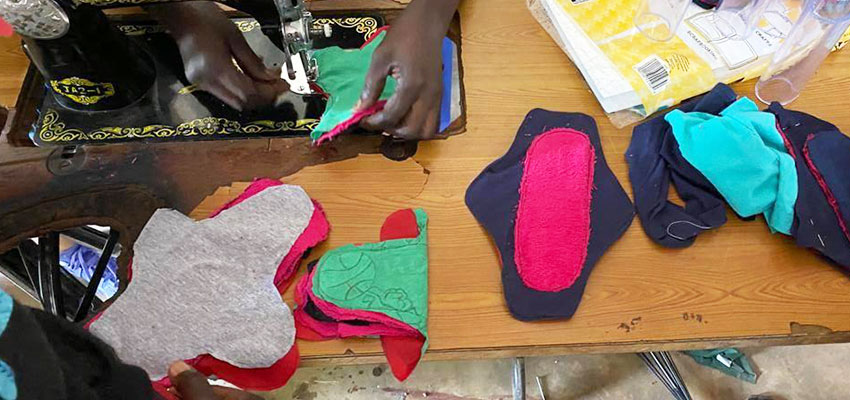
The Society Empowerment Program, SEP, and its founder and executive director Festus Juma, graciously organized a project with a team of MIT-D-Lab students from the fall 2019 D-Lab: Gender & Development class to tackle issues of menstrual health management in Oyugis, Kenya. Festus shared with us that many girls in the community lack access to resources for managing their periods and consequently drop out of school. Thus, with Festus’ guidance, we took a two-pronged approach to a week-long intervention with both an education and maker piece in hopes of exchanging both theoretical knowledge and practical skills with the participants.
The participants of the workshop included leaders within SEP, a combination of coaches and footballers, as well as local seamstresses. With the help of Festus, we met with the participants from 10:00 - 4:00 pm every day, completing workshop activities and conducting discussions in order to develop various tools for tackling menstrual management. The participants themselves mainly consisted of young women between the ages of 17 and 24, accompanied by a handful of young male students and older women who operated the sewing machines. While we maintained diversity within the pool of participants, the group was united by a desire to learn how to make reusable pads and acquire knowledge from the educational curriculum to share with members of the greater community.
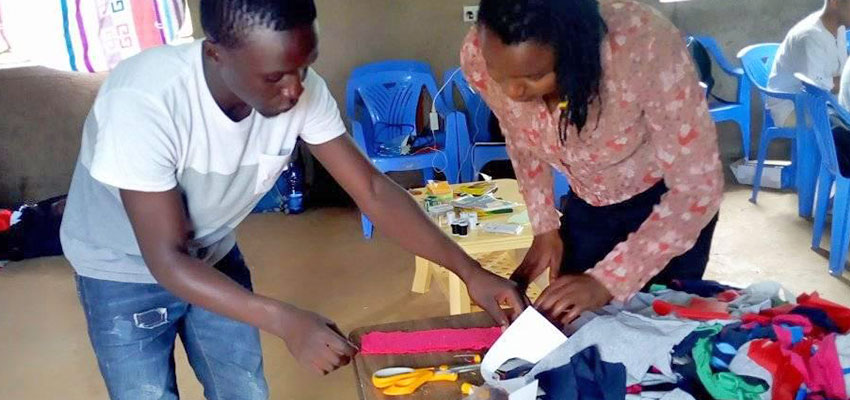
On the first day of the workshop, we started by brainstorming norms of conversation to respect throughout the course of the workshop. Because of the sensitive nature of the educational material — from sharing first period stories to discussing sexual and reproductive health — the group collectively agreed to emphasize the values of respect and confidentiality, while offering the "right to pass" if any question or topic made a participant uncomfortable. After this, we moved into our first activity, an icebreaker centered around names. Participants paired off and asked: What is your name? What is the story behind your name? Who named you? Why? When we reconvened as a group, each pair shared the story of their partner’s name. This activity, although small in scale, opened the door to more intimate and in-depth conversations in the days to follow.
In addition to our icebreaker, we had the participants take a short pre-assessment before jumping into the week’s educational curriculum. The short questionnaire covered the topics of menstrual education, reusable pads, menstrual cups, and general knowledge of menstruation. At the end of the workshops, the participants took a post-assessment with the same set of questions in order to measure what we learned together throughout the course of the workshop.
Reusable Pads Workshop
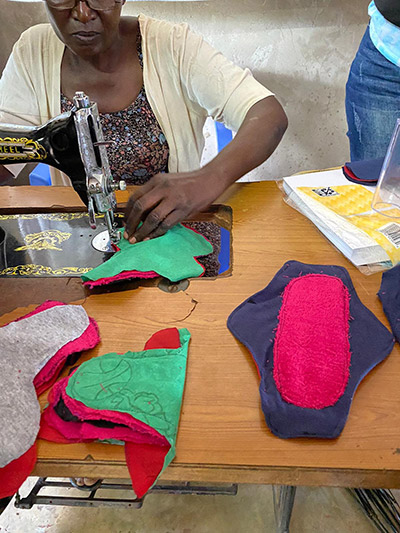
On Monday, we divided the participants into four mixed-gender groups. Each group was asked to create a design template for a reusable pad, which they initially drew on paper and eventually cut out of cardstock. The purpose of the first day was to allow participants to come up with their own ideas without influence from existing commercial products.
On the following day, we began by passing out commercial products to each design team along with seam rippers. Each team then opened up the commercial pads in order to get an idea of which layers and materials were utilized to make the reusable pad. After discussing the participants’ observations from opening up the commercial pads, we led an in-depth discussion regarding the technical aspects of creating a reusable pad. The technical involved the necessity of a top layer, absorbent core, waterproof layer, and bottom layer. Moreover, we talked about which materials would be appropriate for each layer and how to test whether or not a local fabric would be appropriate for a particular layer. After discussing technical, we gave the design teams an opportunity to modify their design templates before passing out fabrics and having them create a basic prototype for their reusable pad. The purpose of Day 2 was not only to iterate over the design and create a basic prototype but to emphasize teamwork and patience throughout the design process.
Some of the issues that we ran into include:
- Access to sewing machines and skilled tailors
- Wastage of material
- Tracing commercial product
- Fatigue due to scheduling in the afternoon
- Underestimating the essential roles of facilitators
On the last day, we shifted the focus from design teams to personalized pads. On the morning of the workshop, we precut all the fabrics which allowed participants to dive into the pad-making process.
Improvements from Day 2:
- Access to two sewing machines and skilled tailors
- Switching to morning schedule
- More engaging facilitators
By the end of the last day, each participant had completed a final product that they were happy with. Moreover, as participants began sewing their pads together, we were able to identify and share best practices from earlier pads with the rest of the group. At the end of the morning, each participant produced a different pad adapted for their body and the local context of Oyugis.
We concluded the pad workshop with a showcase, in which we put approximately 22 pads on display. In addition to the final products, we also placed the initial templates and team prototypes on display, to track the progress of the participants across the three days. With all the participants circled around the display table, we then had each participant stand up and present their personal pad, discussing various design decisions regarding size, shape, absorbance, etc.
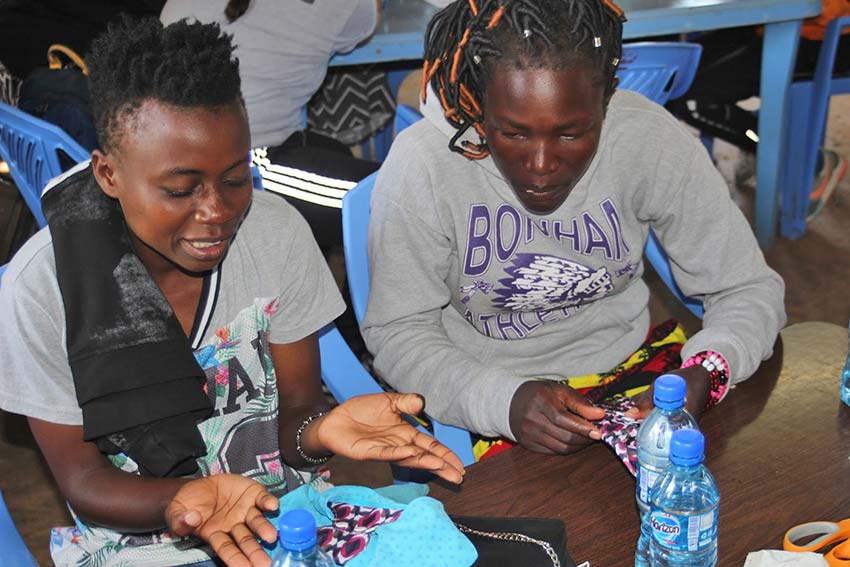
Menstrual Bracelets Activity
For the Basics of Menstruation section, we did a menstrual bracelet activity where the participants created a bracelet with 14 beads to represent the days of the menstrual cycle. The red beads represent menstruation, the white days represent growth of the uterine lining, the pink beads represent ovulation, and the black beads represent premenstrual syndrome (PMS). For each phase/color, we discussed the various physical and emotional symptoms experienced by women during that time. The discussion also allowed us the dispel various myths regarding menstruation. One of the myths that we refuted during the discussion was the notion that there are safe days in the menstrual cycle when women cannot get pregnant. Overall, the menstrual bracelet activity served as a nice way to unite the male and female participants. The participants ended up wearing the bracelets for the rest of the week and would point at it to refer to how far they were in their personal cycles in conversations with their peers. The activity was definitely a success and will continue to serve as a reminder of the information learned about the menstrual cycle for participants in the future.
Introduction to Menstrual Cups
As a complement to the series of Reusable Pad Workshops, part of our educational curriculum included an introduction to menstrual cups. In the local context of Oyugis, many women and girls rely on disposable pads, with few self-identifying as users of reusable pads, tampons, and menstrual cups. Thanks to the generous donation of thirty cups by Lena Cups, we conducted an informative demonstration and a question and answer section about menstrual cups, with each participant receiving a menstrual cup of their own. Together, we walked through how to insert, clean, and use the cup, as well as discussing myths about the products. Some participants were concerned about whether or not the cup would affect their virginity, while others expressed worry about the cup overflowing while being in their body. Two members of the D-Lab team who are personal users of menstrual cups led this discussion and dismantled cup misconceptions while sharing their personal experiences with the product. The takeaway from this session was the importance of individual autonomy in deciding how to best manage menstruation —some participants were excited about the prospect of using cups and having access to the product, while others preferred to continue using pads — but regardless, the menstrual cup session sparked discussion about being comfortable with your body and how everyone takes a different approach to manage their period. If there is a demonstrated interest in menstrual cups going forward, future D-Lab groups and SEP will possibly collaborate to find a community partner to reproduce menstrual cups using a poly caster mold, in order to sustainably produce these cups in the community itself rather than through outside donations.
WASH
To complement the Reusable Pad Workshops, we also led a discussion on Water, Sanitation, and Hygiene (WASH). Together, we talked about hygiene and personal care, how to clean and maintain reusable pads, and proper disposal methods for sanitary products, while discussing the constraints of access to water and latrines. Having attended previous WASH workshops through SEP, the participants shared their current WASH practices, addressing questions of how many times they wash themselves during menstruation and how they dispose of their preferred sanitary products. The themes we talked about as a group during the WASH workshop translated to the reusable pad workshops, as participants will be using and cleaning the product they made.
The body image and positivity workshop aimed to combat stigma related to menstruation and body image. In small groups, we shared our own definitions of body image, stigma, and body positivity and then did a self-portrait activity where the participants drew representations of how they perceive themselves. Following the self-portraits, the participants wrote down personal affirmations, where they brainstormed attributes and qualities they admired about themselves and shared out to the room. As there were many footballers in the room, we heard multiple comments about strength, power, and ability. This workshop provided time for some important self-reflection and allowed participants to share out some of their attributes and amazing contributions, reminding the group that there is no shame related to menstruation and body image.
Sexual & Reproductive Health
We started out Day 4 with our Sexual and Reproductive Health Workshop, with the goal of providing an overview of reproductive education for both women and men. Through informative sessions, break-out groups, and an anonymous Q&A, we covered the themes of family planning, safe sex, and healthy relationships. During the workshop, we simulated the process of STI transmission through an activity titled "You’re At a Party." Some recipients received a singular cup full of skittles, while others received a double-stacked cup; both were instructed to exchange skittles with three other people. After the activity was completed, we asked the group who had ended the game with an orange skittle, which symbolized an STI. Those who had an orange skittle but a double-stacked cup were protected against an STI, as the double-stacked cup represented a condom. This brief activity sparked our discussion about how easy it is to transmit STIs, and how the use of contraceptives can minimize this risk.
After we facilitated a detailed conversation about STIs, PREP, and ARVs, we had an open Q&A portion, driven by anonymous questions from the participants. This allowed for a more interactive conversation about contraception driven by participants, given that the MIT D-Lab team were not experts about the availability and variety of contraceptive methods specific to Oyugis. Together, we shared knowledge to promote awareness of sexual and reproductive health. Additionally, one participant who is an HIV/AIDs advocate, invited to attend the workshops by Festus, contributed crucial information to our conversation. She provided information about the local context, norms, and issues regarding access to contraceptives. Common forms of contraception that participants shared out to the group included Copper IUDs, birth control pills, the DEPO shot, and condoms, and each method came with questions from participants about its effect on virginity, fertility, and pleasure.
Although we intentionally did not include any material in our educational workshops on sexuality and sexual orientation, we received several questions regarding sexuality and sexual orientation during the Q&A, which led to a brief overview of these topics, conducted by a MIT D-Lab member who studies Women’s and Gender Studies. By placing the sexual and reproductive workshop at the end of the week, we hoped participants would feel comfortable raising questions and sharing personal experiences. This workshop upheld one of our original norms of conversation, creating a safe space, where participants could come together to ask questions and discuss sexual and reproductive health.
Reflections and Discussions
On the last day of our workshop, we did a showcase of the reusable pads. Each participant presented their design and explained the process and choices that went behind the creation of their product. By having everyone showcase their personal design and the reasoning behind their approach to the co-design process, we celebrated and learned from one another’s designs. We used this moment to trace the process of how we made the pads in the first place, and what lessons we learned from the design process. It was only after ensuring access to locally available materials, designing paper templates of pads, and creating a prototype as a group that participants collectively succeeded in making a reusable pad they were proud to use and display. Reflecting on the co-design process also meant looking forward and discussing how to best translate the knowledge and skills learned throughout the workshops. Many participants expressed interest in making more reusable pads in order to perfect their design; and through SEP or another partner organization, sell the pads while increasing awareness about this product in the local community. When asked if they now felt comfortable teaching someone else how to make a reusable pad, participants responded with a resounding yes.
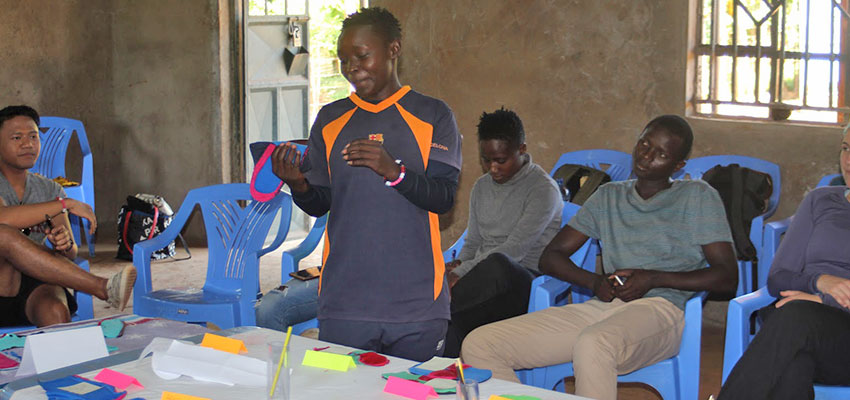
For our final activity, each participant shared a “rose and bud,” something they enjoyed from the past week and something they were looking forward to. A common "rose" theme across SEP participants and MIT D-Lab team members was the connections made during the course of the week. Bonding over the shared experience of the workshops, and for the female participants and MIT D-Lab members, getting your period, created powerful moments and made for a hard goodbye. A widely-shared "bud" was to keep the initial momentum from the workshops going, with the hopes of creating more reusable pads and teaching others to do the same. SEP participants expressed a desire for more workshops in the future for other members of the community and the continuation of a partnership between SEP and D-Lab. The experience of designing reusable pads together proved to be overwhelmingly positive, and the 25 SEP participants and six D-Lab team members will now go forward as ambassadors of this knowledge. Access to menstrual products proves to be an issue throughout the United States and is not unique to Oyugis, Kenya, and in the experience of participating together in these workshops, we each can use this knowledge in the hopes of sparking sustainable change.
Further information
MIT D-Lab class: D-Lab: Gender and Development
Contact
Libby McDonald, MIT D-Lab Lecturer and Inclusive Economies Specialist
Sally Haslanger, Professor, MIT Department of Philosophy and Women's and Gender Studies

